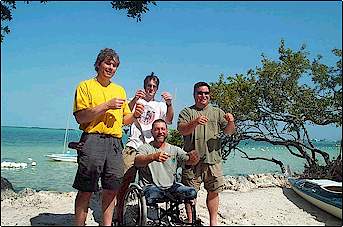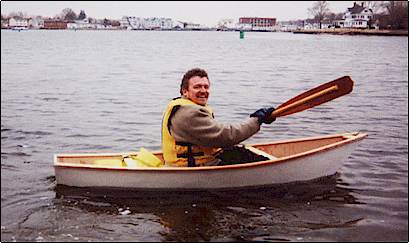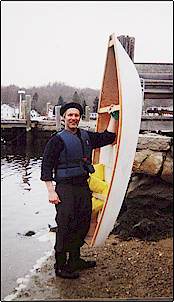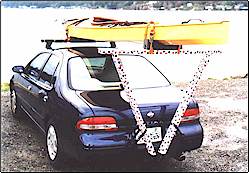Reports
Here are timely reports of interesting goings on from around the
boat building world. If you have pictures of anything of interest please send them
in for posting. Don't be shy. Send to: [email protected]
January, 2001
February, 2001
March, 2001
The race is over, that is, the WaterTribe Challenge 2001. The WaterTribe
Challenge is a 225-mile long race, and can be classified as close to shore Ocean racing.
The race was for kayakers, rowers and sailors all in small boats. It started at Tampa bay
and headed south for Key Largo, a distance of 225 miles as the crow flies, but actual
travel across the water was probably a great deal further.
This is grueling stuff because its not like a cruise where you would
make it at your our own pace, but a day to day thing that give you no choice to the
conditions, weather or currents and the like. Of the 27 competitors only 9 finished
the race; a high dropout rate for any race. Most quit due to bad sea conditions, wind and
waves, so you can imagine what it was like for the ones that finished the race on their
long haul south.
The race had four classes, the classes are for canoes and kayaks
(class 1), Sea Kayaks and Canoes with Stowable Upwind Rigs (class
2) Sea Kayaks and Canoes with Removable Upwind Rigs (class 3, no
finishers) and finally the open boat class (class 4, this is anything, but it has to be
small and unballasted) The over all winner was a sailing dingy called
"Vanman", a 14.5-foot Expedition sailing dingy. He was the only finisher
in his class with 5 others dropping out before the finish. Most non-finishers complained
that the conditions were to rough.

1st Place Winners Classes 4, 2, and
1Vanman,
ManitouCruiser, KevlarKid ThereAndBackAgain
Vanman on the first day out broke his mast but he
repaired it and pressed on. At Cayo Costa he capsized his boat three times in wind and
waves and there he was dismasted again. He wasn't out of the race yet and got things going
again and continued on. He headed for Key Largo but not before he was capsized again, he
finished as the overall winner with an arrival on March the 10, 2001 at 2:15 P.M.
The next two boats in were within minute apart, they were the Manitou
Cruiser 1 (a catamaran hulled boat, made up from two Kruger kayak hulls)
The Manitou Cruiser 1 arrived at 7:00 P.M. on March 10, 2001 and
the next boat in was only six minutes behind the Manitou Cruiser 1, and it was called the
Kevlar Kid and was a Kruger single kayak. It appears the ones in charge gave both these
boat a 1st in class for Class 2 this must be an error in their report as it looks as if
the Manitou Cruiser 1 arrived first. WaterTribes web page said they will be posting more
information and stories on the race in the near future. This is their web page if you want
to see the reports:https://www.watertribe.com/
The winner of class 1 the sea kayaks was won by a boat called
"There and Back Again"; it arrived at 10.06 on March 10, 2001,the were a total
of six boats that finished in this class and 8 that dropped out of it. This class had the
largest number of entrants, with 14 boats entering the race. "There and Back
Again" earned a first in class 1 and a third overall. I have no picture of this boat
but it is a single sea kayak, also unfortunately I do not have any of the name of the
captains of any of these boats.
What is of interest to me here is the kayaks that won class 1. The
overall winner "Vanman" was a Expedition sailing dingy and its design is much
like a Laser. This boat that could surely plane in the right conditions and would give the
boat good speed over the entire race course.
We have to give credit to the crew of Vanman for he must have surely
put a lot of effort into handling the boat and keeping it upright, but that effort is hard
to compare it to the amount of physical effort put out by the crews paddling the sea
kayaks. They finished only five hours after the "Vanman"
sailing dinghy and I might point out under their power alone, no sail.
This gives you an indication of the seaworthiness and speed capabilities of sea
kayaks, great boats. Don
|
March, 2001
A report for you, Chuck, with pics. Cheers, G
It was one of those amazing coincidences: I live near London, but I was going to
Connecticut for a few days and David Colpitts, based in Hartford, had just built my Mk 1
one-sheeter. And he said we could meet and I could have a paddle in it, weather
permitting.
Well, we met on the allotted day, paddled a bit and took some photos, even though the
water was COLD and to be truthful the weather only just permitted. Some of the museum
people came out and laughed at our microboat antics and took photos too, which turned out
to be a great introduction to them, as I wanted to make the very most of my time there.

>From paddling the little thing, my conclusions were that the little boat
worked, but was just a little too wobbly for someone of my weight and height. So... I'm
planning to take some action.
I started by simply making the Mk 1 beamier, but then I found it was perfectly possible to
squeeze a deadrise hull with far better stability characteristics out of that same single
sheet of plywood - where the original one-sheeter had a righting moment of 12foot-lbs., at
5 degrees, the deadrise model offers 24foot-lbs.
I've also toyed with the idea of a version with a fuller stern and bows designed to
accommodate the fuller figure, or a 30sqft sailing rig for a lazy summer breeze, but that
hasn't been finalised yet...
 David reckons he can make one of these hulls in about 12 hours.
He uses PL adhesive for tack and tape work, and regular lumber yard ply. I
think it's safe to say that this little boat offers some of the most fun for your buck you
are likely to find anywhere. And it makes a fine introduction to
stitch-and-glue/tack-and-tape boatbuilding. David reckons he can make one of these hulls in about 12 hours.
He uses PL adhesive for tack and tape work, and regular lumber yard ply. I
think it's safe to say that this little boat offers some of the most fun for your buck you
are likely to find anywhere. And it makes a fine introduction to
stitch-and-glue/tack-and-tape boatbuilding.
I'll update my website at https://home.clara.net/gmatkin/design.htm
with some rather basic plans shortly. I'm also hoping to persuade David to share his way
of making double paddles from closet pole and scrap ply - though I'm prepared to guess
that most people will be able to improvise without his help.
If you do build any of these craft, have fun but please keep safe - and that will mean
staying within your depth, or at least within easy swimming distance of the shore.
Gavin Atkin
|
March, 2001
Chuck,
Just a note to let you know about our recently posted site. Looks as if
at least some of our stuff would be of direct interest to your subscribers and the other
(aquaculture) stuff may be of more general interest.
Muzza
Murray Isles Designs - Marine Technology Consultants
Specialist Vessel Design * Project Management * Workplace Training
PO Box 474, Nth Hobart, TAS 7002
Phone: 03 6231 5553 * Fax: 03 6231 5553 * Mobile: 0407 543 941
Visit our web site at: https://www.islesdesign.com
Read our latest Newsletter at: https://www.islesdesign.com/longshore/new.html
|
March, 2001
Dear Chuck,
 I have invented a small device that makes small boat ownership even
better. This device is a hitch-ready bracket set that allows people to easily make a
custom rack at the back end of their car, thus making "cartopping" one's boat
easier and safer. I have invented a small device that makes small boat ownership even
better. This device is a hitch-ready bracket set that allows people to easily make a
custom rack at the back end of their car, thus making "cartopping" one's boat
easier and safer.
Please feel free to visit my product's site at www.veerack.com
Thanks for the plans for the simple folding
kayak. A friend and I will begin building a pair this weekend.
Thanks,
Eric C. Pollack
Inventor and Owner, Veerack.com
[email protected]
|
March, 2001
After enjoying Duckworks for many months, I decided to write and say how much I
enjoy it.
Made a misteak (pun!) and subscribed to Boat Journal, or whatever it is called, because it
was the descendant of Small Boat Journal which I subscribed to when it began. MISTEAK big
time. Every issue looked the same. Nothing about boats. Lots of overpriced metal flake
plastic.
I have built a number of Bolger/Payson boats- 2 Punts, 2 Teals, one June Bug
and one Zephyr. Also spent a number of weeks messing about with Dynamite before he became
famous.
However, I find myself a bit older, losing youthful energy, which is being replaced by a
more thoughtful (slower) approach to boat building. Am realizing that being a bit inland,
away from the Atlantic and other large lakes, but near a smaller river, perhaps I should
try something different.
A few years ago, I sold my MG which had waited patiently for a number of years in my
garage for the complete overhaul and rebuild I never got around to giving her. In my
grieving over her loss, I bought two British Seagull outboards, which are satisfying my
yearning for British machinery to tinker with. Have torn down, cleaned, repainted, and
rebuilt one of these which I hope to test drive on yet another Punt under construction in
the newly freed up garage. The Seagull started first pull!
Anyone have experience with small outboards?
Am thinking of a June Bug with the sprit-rig shown on the Cartopper and a polysail so it
can be stowed inside the boat, and also with oars, Seagull outboard, etc. Can then use it
for rowing, sailing, motoring.
Comments?
Thx.
Bruce Nickerson
[email protected]
|
|
![]()